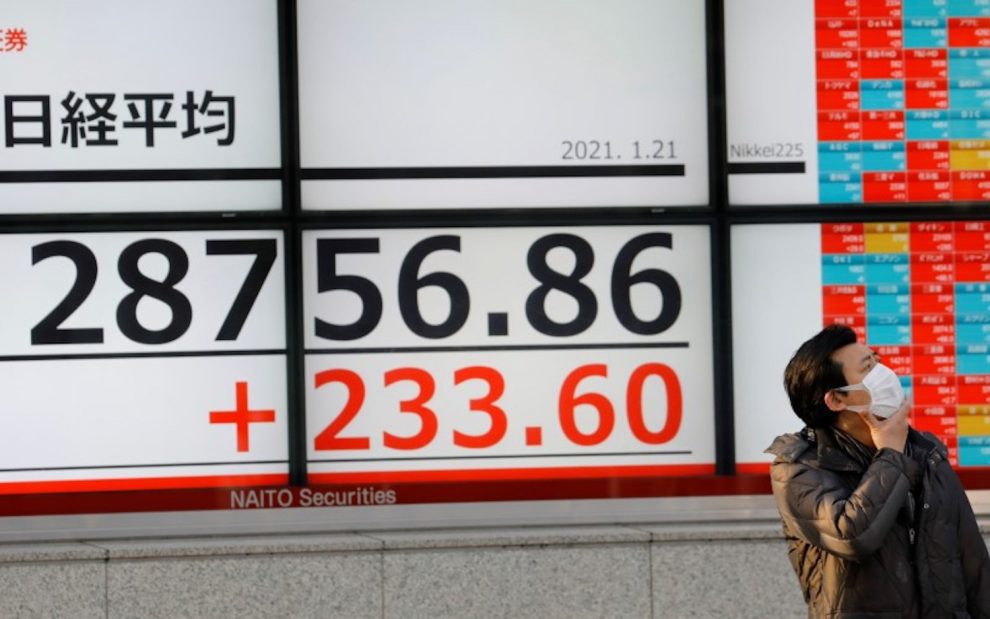Asian stocks followed Wall Street’s lead again on Thursday – down across the board, as investors interpreted the US Federal Reserve’s latest policy remarks as hawkish for the year ahead.
MSCI’s broadest index of Asia-Pacific shares outside Japan was down 0.56%, while Japan’s Nikkei slid 1.37%.
China’s blue-chip dipped 0.8%, with Hong Kong’s Hang Seng and the ASX in Sydney both tumbling 1.3%, while the BSE Sensex in Mumbai was also down 0.85%.
The Fed held interest rates steady, as expected, on Wednesday. But it raised its end-2024 and 2025 dot plot projections by 50 bps each, essentially signalling “higher-for-longer” rates, Nomura analysts said in a note.
ALSO SEE: China Reviewing Quant Trading Amid Anger Over Short Selling
‘A bad recipe for Asian stocks’
“Rising US bond yields, stronger USD and elevated energy prices – all are ingredients for a bad recipe for Asian stocks,” Nomura said.
The reaction from the US equity markets to the Fed’s decision was bearish and opened the door for follow-up sell-offs, said Redmond Wong, Greater China market strategist at Saxo Markets.
“This development in the US market weighed down the already cautious sentiment in the Hong Kong and mainland markets,” he said.
Chinese regulators have started to probe some hedge funds and brokerages on quantitative trading strategies amid a growing outcry against a sector able to profit from share price falls and volatility, sources told Reuters.
Meanwhile, to restore market confidence, China pledged to speed up the introduction of more policies to consolidate its economic recovery, state media CCTV reported on Wednesday, citing a cabinet meeting chaired by Premier Li Qiang.
Big Hong Kong-listed tech firms fell 1.9%, with Tencent and Alibaba lost 2% each.
Country Garden climbed 2% after the embattled company said its creditors had approved extending repayment of seven bonds as of September 12.
In A-shares, consumer staples dropped 1.8% to lead the decline.
Most regional stock markets retreated. Stocks in Singapore and South Korea were set for their largest daily falls in over a month. Equities in Seoul slumped 1.6% and Singapore’s benchmark index slipped 1.1%. Taiwan’s shares slid 1.4%.
Bangkok and Manila shares were the outliers in the region, rising 0.3% and 0.4% respectively.
Separately, data on Wednesday showed Taiwan’s export orders contracted for the 12th-straight month in August and missed expectations, as demand remains subdued due to factors such as high interest rates and weak demand from China.
US Treasury notes at 17-year high
The yield on two-year US Treasury notes rose to a 17-year high of 5.1970% on Thursday morning and hovered around the 5.18% level by early afternoon.
Japan’s 10-year government bond yield rose to its highest in a decade, tracking US 10-year Treasury yields which rose to 4.4310%, a 16-year peak.
“We expect bond yields to see further upside in the very near-term given the Fed’s hawkish position,” said Tai Hui, APAC chief market strategist, JP Morgan Asset Management.
“However, high interest rates will eventually cool the economy, leading to falling yields,” he said, adding that they remain constructive on not only long-tenor government bonds or investment grade corporate debt, but also assets like growth and tech stocks.
The median forecast for the federal funds rate is 5.1% by year-end, versus 4.6% estimated in June.
Even as inflation slows for the rest of 2023 and in coming years, the Fed anticipates only modest initial reductions to its policy rate.
Dollar strongest since March, Asian currencies fall
Upward revisions to US policymakers’ median rate forecasts for the next couple of years triggered a rebound in the US dollar, pushed US Treasury yields to multi-year highs, flattened the yield curve and sent stocks tumbling.
The dollar index, which measures the currency against a basket of rivals, rose as high as 105.59 on Thursday, its strongest since March 9, pushing the yen close to its weakest since November.
Asian currencies fell on Thursday as capital outflows and the Fed’s hawkish stance on monetary policy that boosted Treasury yields and strengthened the dollar dampened risk sentiment.
Investors awaited monetary policy decisions from central banks in Indonesia and the Philippines, which were expected to keep interest rates steady later in the day and for the rest of the year.
The Philippine peso fell 0.5% to a two-week low and Indonesia’s rupiah was down 0.1% ahead of the rate decisions.
In Thailand, the baht pared early losses to depreciate 0.1% after Prime Minister Srettha Thavisin said the country’s central bank was monitoring the weak baht, which was not entirely bad for the economy.
Sterling, meanwhile, sank to fresh multi-month lows in the wake of an inflation report that surprised to the downside on Wednesday, as questions ramp up about whether the Bank of England may follow its US peer in holding rates on Thursday.
Major stock futures wavered in early afternoon Asia time. US stock futures, the S&P 500 e-minis, were down 0.3%. The pan-region Euro Stoxx 50 futures, German DAX futures and FTSE futures all fell by roughly 1%.
Investors are now also awaiting monetary policy decisions on Thursday from Indonesia, the Philippines and Taiwan, while a finely balanced call from the Bank of England will also give steer to Asian markets.
Oil prices fell in Asian trade on Thursday, after posting the largest fall in a month in the previous session. US crude dipped 0.72% to $89.01 a barrel. Brent crude fell to $92.87 per barrel.
Gold was slightly lower, with spot gold trading at $1,927.96 an ounce.
- Reuters with additional editing by Jim Pollard
ALSO SEE:
Toshiba to Delist After $13.5bn Takeover by JIP and Allies
China Sees Calls for Deep Reform, Others Urge More Spending
Myanmar’s Central Bank Cancels 120 Forex Licences – RFA
























